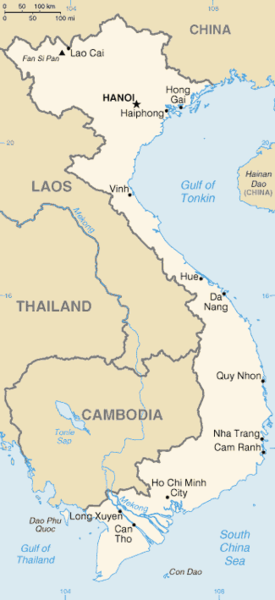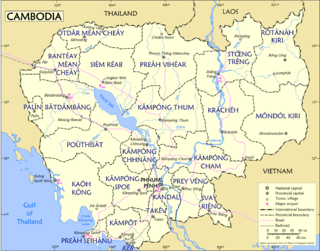Svay Pak is an urban commune of overseas Vietnamese in Cambodia, north of Phnom Penh. The commune has been renowned as a destination for adult and child prostitution, and while the latter has been cracked down upon, its prevalence as of 2017 was disputed.

Sex trafficking is human trafficking for the purpose of sexual exploitation. It has been called a form of modern slavery because of the way victims are forced into sexual acts non-consensually, in a form of sexual slavery. Perpetrators of the crime are called sex traffickers or pimps—people who manipulate victims to engage in various forms of commercial sex with paying customers. Sex traffickers use force, fraud, and coercion as they recruit, transport, and provide their victims as prostitutes. Sometimes victims are brought into a situation of dependency on their trafficker(s), financially or emotionally. Every aspect of sex trafficking is considered a crime, from acquisition to transportation and exploitation of victims. This includes any sexual exploitation of adults or minors, including child sex tourism (CST) and domestic minor sex trafficking (DMST).

Cambodia is a source, transit, and destination country for human trafficking. The traffickers are reportedly organized crime syndicates, parents, relatives, friends, intimate partners, and neighbors. Despite human trafficking being a crime in Cambodia, the country has a significant child sex tourism problem; some children are sold by their parents, while others are lured by what they think are legitimate job offers like waitressing, but then are forced into prostitution. Children are often held captive, beaten, and starved to force them into prostitution.
Vietnam is primarily a source country for women and children trafficked for commercial sexual exploitation and forced labor. Women and children's are trafficked to the People’s Republic of China (P.R.C), Cambodia, Thailand, the Republic of Korea, Malaysia, Taiwan, and Macau for sexual exploitation. Vietnamese women are trafficked to the P.R.C., Taiwan, and the Republic of Korea via fraudulent or misrepresented marriages for commercial exploitation or forced labor. Vietnam is also a source country for men and women who migrate willingly and legally for work in the construction, fishing, or manufacturing sectors in Malaysia, Taiwan, P.R.C., Thailand, and the Middle East but subsequently face conditions of forced labor or debt bondage. Vietnam is a destination country for Cambodian children trafficked to urban centers for forced labor or commercial sexual exploitation. Vietnam has an internal trafficking problem with women and children from rural areas trafficked to urban centers for commercial sexual exploitation and forced labor. Vietnam is increasingly a destination for child sex tourism, with perpetrators from Japan, the Republic of Korea, the P.R.C., Taiwan, the UK, Australia, Europe, and the U.S. In 2007, an Australian non-governmental organization (NGO) uncovered 80 cases of commercial sexual exploitation of children by foreign tourists in the Sa Pa tourist area of Vietnam alone.

Human trafficking is the trade of humans for the purpose of forced labour, sexual slavery, or commercial sexual exploitation. Human trafficking can occur within a country or trans-nationally. It is distinct from people smuggling, which is characterized by the consent of the person being smuggled.
Transnational efforts to prevent human trafficking are being made to prevent human trafficking in specific countries and around the world.
Sex trafficking in Thailand is human trafficking for the purpose of sexual exploitation and slavery that occurs in the Kingdom of Thailand. Thailand is a country of origin, destination, and transit for sex trafficking. Child prostitution in Thailand is a problem. In Thailand, close to 40,000 children under the age of 16 are believed to be in the sex trade, working in clubs, bars, and brothels.
Human trafficking in Nepal is a growing criminal industry affecting multiple other countries beyond Nepal, primarily across Asia and the Middle East. Nepal is mainly a source country for men, women and children subjected to the forced labor and sex trafficking. U.S. State Department's Office to Monitor and Combat Trafficking in Persons placed the country in "Tier 2" in 2017.

China is a main source and also a significant transit and destination country for men, women, and children who are subjected to trafficking in persons, specifically forced labour and forced prostitution. Women and children from China are trafficked to Africa, Europe, Latin America, the Middle East, and North America, predominantly Taiwan, Thailand, Malaysia, and Japan for commercial sexual exploitation and forced labour. Women and children from Myanmar, Vietnam, Mongolia, former USSR, North Korea, Romania, Indonesia, Nepal, Pakistan and Ghana are trafficked to China for commercial sexual exploitation and forced labour.

Human trafficking in Texas is the illegal trade of human beings as it occurs in the state of Texas. It is a modern-day form of slavery and usually involves commercial sexual exploitation or forced labor, both domestic and agricultural.

Not My Life is a 2011 American independent documentary film about human trafficking and contemporary slavery. The film was written, produced, and directed by Robert Bilheimer, who had been asked to make the film by Antonio Maria Costa, executive director of the United Nations Office on Drugs and Crime. Bilheimer planned Not My Life as the second installment in a trilogy, the first being A Closer Walk and the third being the unproduced Take Me Home. The title Not My Life came from a June 2009 interview with Molly Melching, founder of Tostan, who said that many people deny the reality of contemporary slavery because it is an uncomfortable truth, saying, "No, this is not my life."

Human trafficking in Southeast Asia has long been a problem for the area and is still prevalent today. It has been observed that as economies continue to grow, the demand for labor is at an all-time high in the industrial sector and the sex tourism sector. A mix of impoverished individuals and the desire for more wealth creates an environment for human traffickers to benefit in the Southeast Asia region. Many nations within the region have taken preventive measures to end human trafficking within their borders and punish traffickers operating there.
Sex trafficking in China is human trafficking for the purpose of sexual exploitation and slavery that occurs in the People's Republic of China. China, the world's most populous country, has the second highest number of human trafficking victims in the world. It is a country of origin, destination, and transit for sexually trafficked persons.

Sex trafficking in Vietnam is human trafficking for the purpose of sexual exploitation and slavery that occurs in the Socialist Republic of Vietnam. Vietnam is a source and, to a lesser extent, destination country for sexually trafficked persons.

Sex trafficking in Cambodia is human trafficking for the purpose of sexual exploitation and slavery that occurs in the Kingdom of Cambodia. Cambodia is a country of origin, destination and transit for sex trafficked persons.
Sex trafficking in the Philippines is human trafficking for the purpose of sexual exploitation and slavery that occurs in the Republic of the Philippines. The Philippines is a country of origin and, to a lesser extent, a destination and transit for sexually trafficked persons.
Sex trafficking in Japan is human trafficking for the purpose of sexual exploitation and slavery that occurs in the country. Japan is a country of origin, destination, and transit for sexually trafficked persons.

Sex trafficking in South Korea is human trafficking for the purpose of sexual exploitation and slavery that occurs in the Republic of Korea. South Korea is a country of origin, destination, and transit for sexually trafficked persons. Sex trafficking victims in the country are from South Korea and foreigners.

Cybersex trafficking, live streaming sexual abuse, webcam sex tourism/abuse or ICTs -facilitated sexual exploitation is a cybercrime involving sex trafficking and the live streaming of coerced sexual acts and/or rape on webcam.







